Key takeaways:
- Rust forms from the combination of moisture, oxygen, and metal, especially in salty marine environments, making vigilance essential for yacht owners.
- Regular inspections and timely rust treatment can prevent costly repairs and extend the lifespan of a yacht.
- Using materials like stainless steel and marine-grade aluminum, along with quality coatings, helps resist rust effectively.
- Effective cleaning techniques, such as using vinegar and baking soda or commercial rust removers, can effectively restore metal surfaces and prevent rust accumulation.
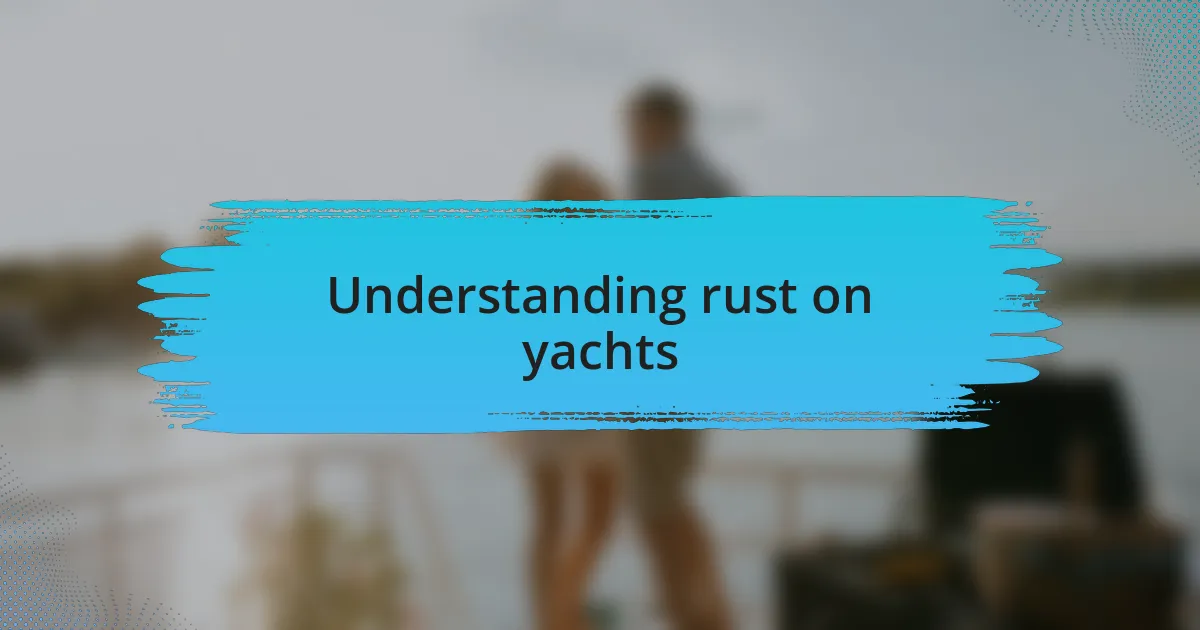
Understanding rust on yachts
Rust is a common concern for yacht owners, particularly those with metal components exposed to saltwater. I remember my first experience noticing those small, reddish-brown patches forming on my yacht’s hull. It was a heart-sinking moment; I had invested so much time and money into that beauty, and to see it suffer from corrosion felt like a personal loss.
Understanding how rust forms is vital. It happens when moisture, oxygen, and metal come together, creating an electrochemical reaction. Have you ever thought about how often these elements are present on the water? The irony is that while you cherish the open sea, its salty environment continually assaults your vessel. It’s a constant battle, but with the right knowledge, you can keep your yacht looking pristine.
Prevention is key, and recognizing rust early can save you from costly repairs down the line. I once neglected a small rust spot, thinking it was minor, but it quickly spread, turning into a larger issue. That’s when I realized the importance of regular inspections. Isn’t it reassuring to know that with a little vigilance, you can protect your investment?
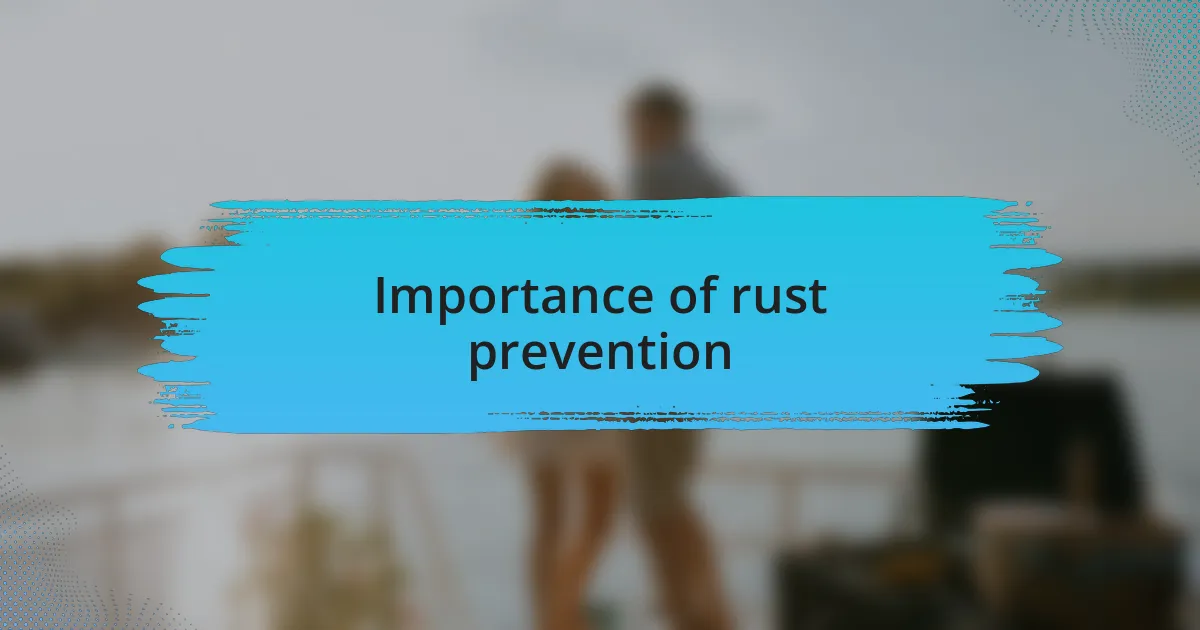
Importance of rust prevention
Rust prevention is not just about maintaining aesthetics; it’s a crucial aspect of preserving your yacht’s integrity. I recall the time I noticed some minor rust around the deck fittings. At first, it seemed insignificant, but that little spot reminded me of the importance of vigilance. After all, every ounce of rust is like a tiny thief, stealing away the strength and value of your vessel.
Additionally, the costs associated with rust repair can be staggering. When I faced an unexpected repair bill after neglecting some rust in a hard-to-see area, it hit me hard. What if you could avoid that kind of financial stress by investing a little time in prevention? Consistent maintenance and rust treatment not only keep my yacht visually appealing but also significantly extend its lifespan.
Think about the pride you feel when your yacht is in top shape. I know I do every time I step aboard and admire her gleaming surface. Rust can undermine that pride and ultimately diminish the joy of ownership. When we embrace regular maintenance routines, we’re not just safeguarding our investment; we’re also ensuring countless memorable adventures on the water.
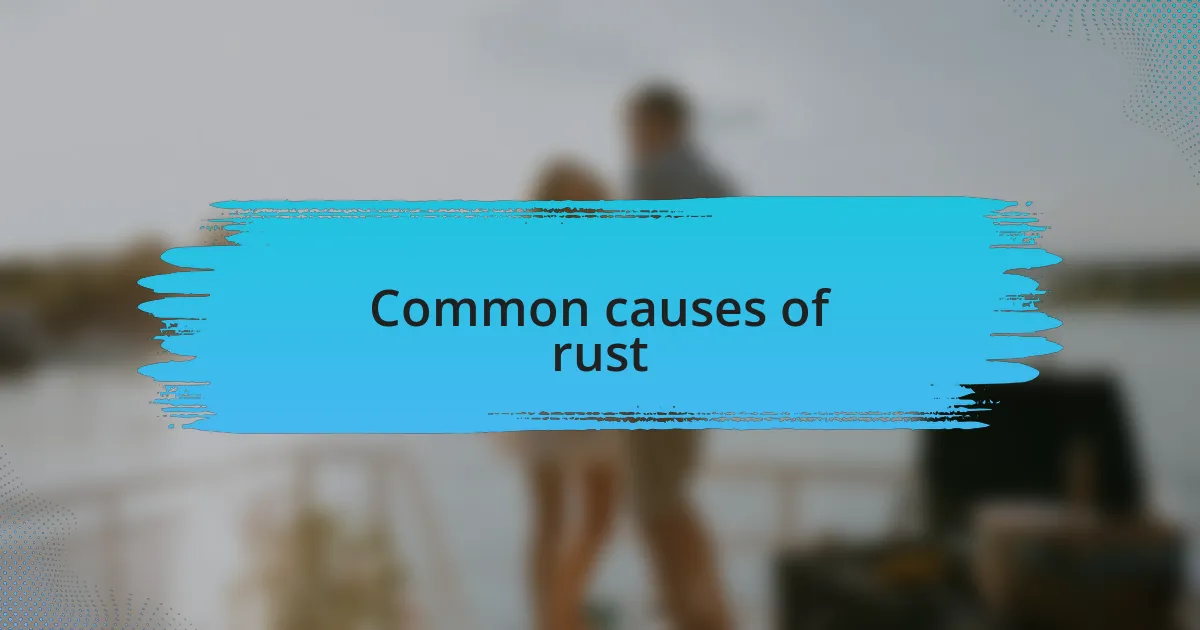
Common causes of rust
When I think about the common causes of rust on yachts, moisture immediately comes to mind. Living near the coast, I’ve seen firsthand how saltwater can accelerate corrosion. Just one misstep, like failing to rinse off salt residue after a day on the water, can lead to those dreaded rusty patches appearing in no time.
Another factor that often contributes to rust is the presence of metal surfaces that aren’t well protected. I once overlooked a small area beneath a winch, thinking it was too minor to worry about. A few months later, I discovered rust creeping in. That experience taught me a valuable lesson: every exposed metal surface deserves attention.
Lastly, the combination of poor ventilation and humidity can create an environment ripe for rust to develop. I’ve had moments where I noticed condensation building up in storage compartments, and it made me realize that keeping these areas dry is essential. Have you ever checked your yacht’s storage for moisture? It’s surprising how easily rust can take hold when we don’t consider these simple yet effective mitigation strategies.
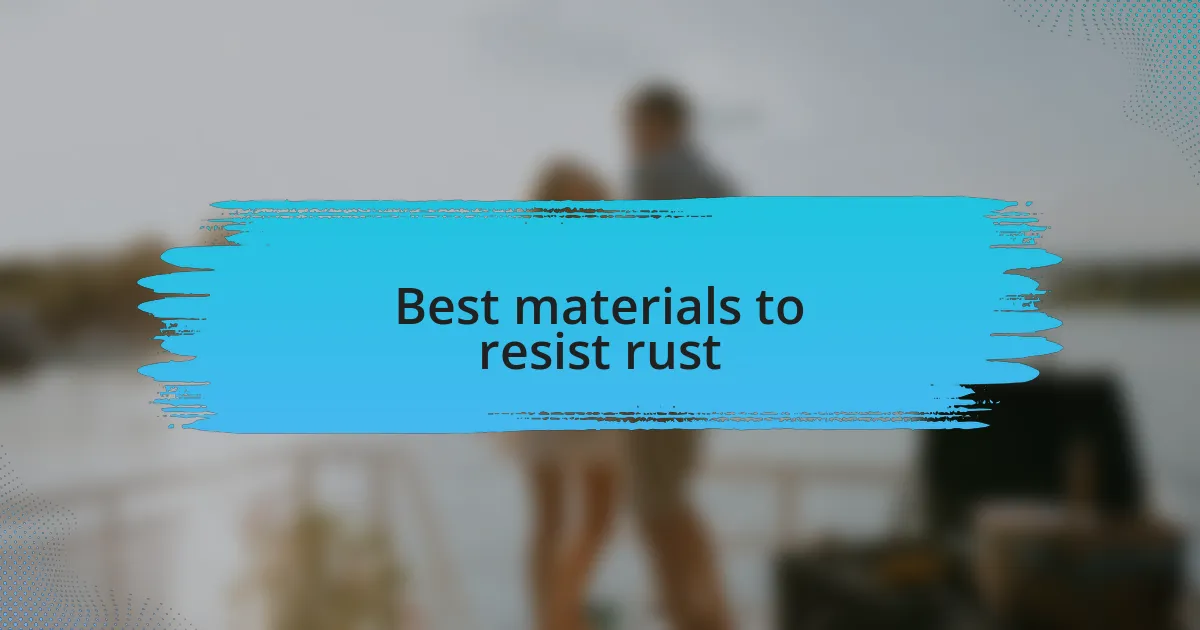
Best materials to resist rust
When it comes to materials that fight back against rust, stainless steel always ranks high on my list. I remember when I replaced a few old fittings with stainless steel ones; not only did they look sleek, but they also stood up beautifully to the harsh marine environment. If you’re considering upgrades, think about how these fittings can save you from future headaches.
Another fantastic option is aluminum, particularly marine-grade aluminum. I once outfitted my yacht with aluminum railings that have held up remarkably well over the years. The lightness of the material, combined with its natural resistance to oxidation, makes it a practical choice for any yacht owner. Have you thought about switching to aluminum components for a little extra peace of mind?
Lastly, let’s not forget about quality coatings. I have had great success with epoxy paints that provide not just a protective barrier, but also a stylish finish. Applying a good coat over exposed metal can significantly enhance longevity. It’s worth considering: how often do you think about the coatings protecting your investments?
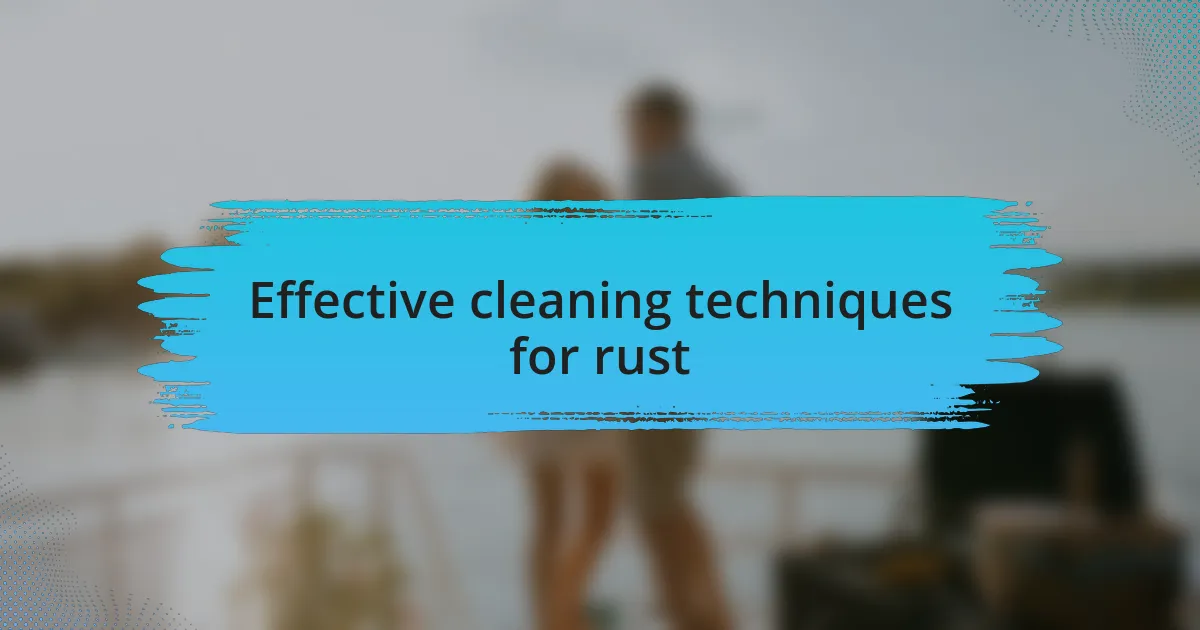
Effective cleaning techniques for rust
One effective cleaning technique I’ve found involves using a mixture of vinegar and baking soda. The reaction between these two not only helps to lift rust but also leaves a fresh scent behind. I remember tackling some rusty handrails on my yacht; a simple paste of these two ingredients transformed them from eyesores to shining examples of cleanliness—who knew cleaning could feel so rewarding?
Another method that has proven to be incredibly efficient is using a wire brush or a power sander. I once took a day to tackle some stubborn rust on an older boat bumper, and that wire brush made quick work of it. It’s amazing how satisfying it is to watch the rust flake away, revealing the metal underneath. Just be sure to wear protective gear—those rust particles can get airborne and nobody wants to breathe that in, right?
For those tougher spots, a commercial rust remover can be a godsend. I like to keep a bottle on hand for emergencies. The powerful formula works wonders, but I always follow up with a good rinse and a protective coating to ensure lasting results. Have you tried any of these methods? Sometimes it takes a little experimentation to find the right solution for your specific needs.

Personal experiences with rust issues
I vividly recall my first encounter with rust on my beloved yacht’s deck. I had planned a weekend getaway with friends, only to discover unsightly rust spots greeting me instead. It was disheartening and threatened to ruin the excitement of the trip. I quickly learned that addressing these issues not only restored the aesthetics but also provided peace of mind, knowing my yacht was in good shape.
Over the years, I’ve seen rust nibbling away at various spots on my yacht during the off-season. I still remember feeling a mix of frustration and determination as I meticulously sanded down a particularly stubborn patch on the engine cover. It was a labor-intensive task, but the moment I saw the original finish shine through again, a wave of satisfaction washed over me. Have you had that feeling when hard work pays off? It’s like rediscovering a hidden gem.
While maintenance routines often get overlooked, my encounters with rust have taught me the importance of diligence. I remember being caught off-guard by some rust creeping along the hinges of a hatch. Each break in routine felt like a battle lost, but those moments ignited a newfound commitment to regular inspections. It’s amazing how proactively facing these challenges can lead to smoother sailing in the long run.